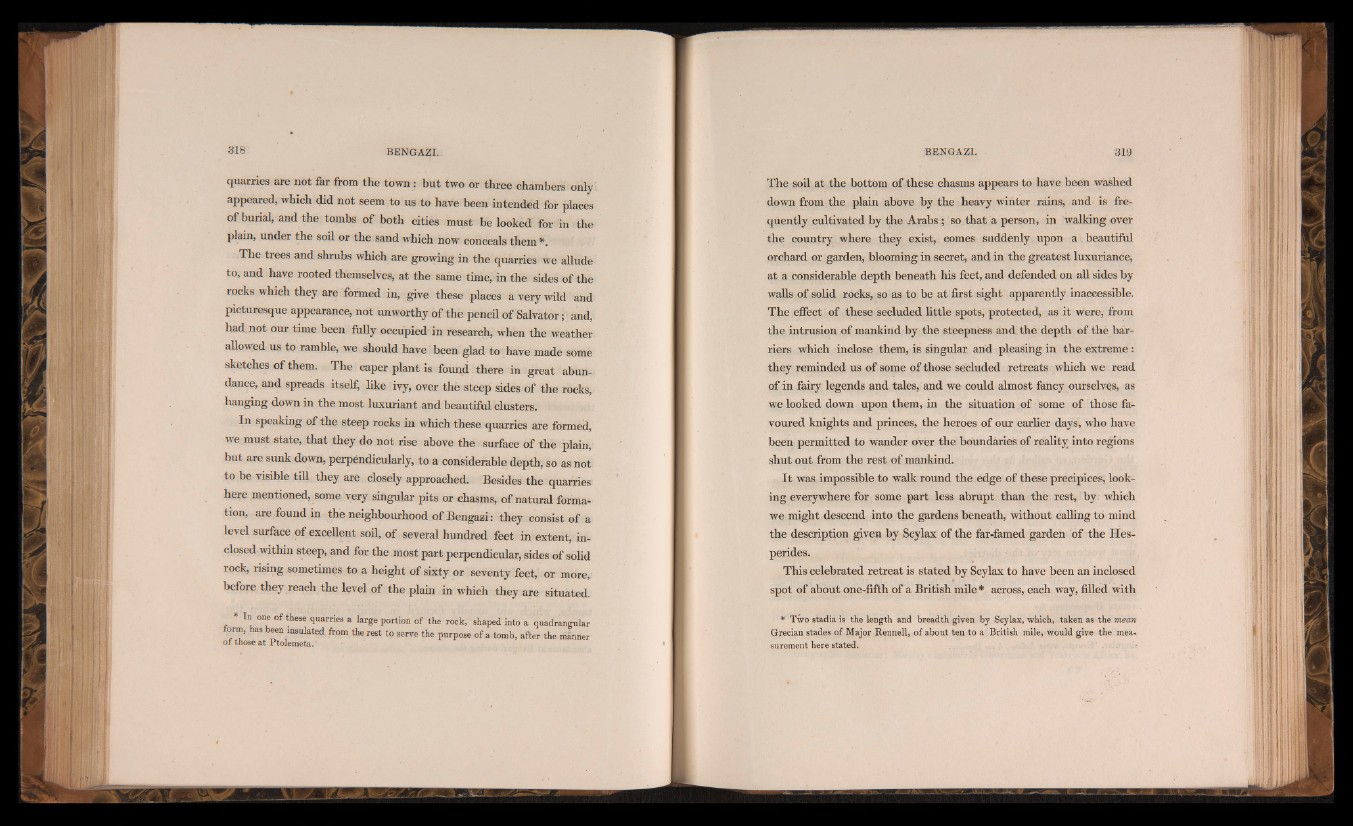
quarries are not far from the town: but two or three chambers only
appeared, which did not seem to us to have been intended for places
of burial, and the tombs of both cities must be looked for in the
plain, under the soil or the sand which now conceals them *.
The trees and shrubs which are growing in the quarries we allude
to, and have rooted themselves, at the same time, in the sides of the
rocks which they are formed in, give these places a very wild and
picturesque appearance, not unworthy of the pencil of Salvator; and,
had not our time been fully occupied in research, when the weather
allowed us to ramble, we should have been glad to have made some
sketches of them. The caper plant is found there in great abundance,
and spreads itself, like ivy, over the steep sides of the rocks,
hanging down in the most luxuriant and beautiful clusters.
In speaking of the steep rocks in which these quarries are formed,
we must state, that they do not rise above the surface of the plain
but are sunk down, perpendicularly, to a considerable depth, so as not
to be visible till they are closely approached. Besides the quarries
here mentioned, some very singular pits or chasms, of natural formation,
are found in the neighbourhood of Bengazi: they consist of a
level surface of excellent soil, of several hundred feet in extent, inclosed
within steep, and for the most part perpendicular, sides of solid
rock, rising sometimes to a height of sixty or seventy feet, or more,
before they reach the level of the plain in which they are situated.
* In one of these quarries a large portion of the rock, shaped into a quadrangular
orm, has been insulated from the rest to serve the purpose of a tomb, after the manner
of those at Ptolemeta.
The soil at the bottom of these chasms appears to have been washed
down from the plain above by the heavy winter rains, and is frequently
cultivated by the Arabs ; so that a person, in walking over
the country where they exist, comes suddenly upon a beautiful
orchard or garden, blooming in secret, and in the greatest luxuriance,
at a considerable depth beneath his feet, and defended on all sides by
walls of solid rocks, so as to be at first sight apparently inaccessible.
The effect of these secluded little spots, protected, as it were, from
the intrusion of mankind by the steepness and the depth of thè barriers
which inclose them, is singular and pleasing in the extreme :
they reminded us of some of those secluded retreats which we read
of in fairy legends and tales, and we could almost fancy ourselves, as
we looked down upon them, in the situation of some of those favoured
knights and princes, the heroes of our earlier days, who have
been permitted to wander over the boundaries of reality into regions
shut out from the rest of mankind.
I t was impossible to walk round the edge of these precipices, looking
everywhere for some part less abrupt than the rest, by which
we might descend into the gardens beneath, without calling to mind
the description given by Scylax of the far-famed garden of the Hes-
perides.
This celebrated retreat is stated by Scylax to have been an inclosed
spot of about one-fifth of a British mile* across, each way, filled with
* Two stadia is the length and breadth given by Scylax, which, taken as the mean
Grecian stades of Major Rennell, of about ten to a British mile, would give the measurement
here stated.